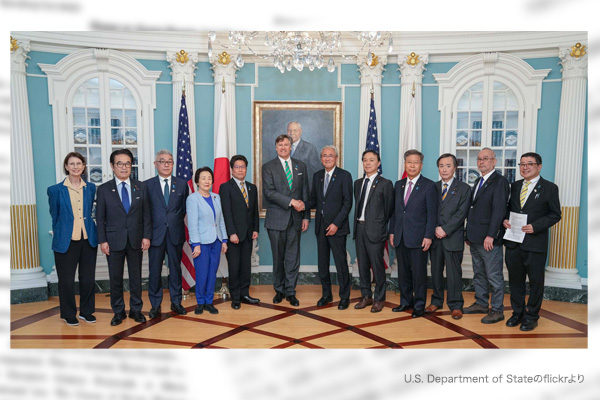As the chairman of an organization supporting Japanese victims of abduction by North Korea, I visited the United States from April 29 to May 4 together with members of the families’ association and Japanese lawmakers working on the abduction issue. We could confirm that the U.S. Trump administration has a strong will to help resolve the issue and that both Republican and Democratic members of the U.S. Congress support the administration’s position.
Movement for solidarity in the U.S. Congress
In place of Secretary of State Marco Rubio who had been scheduled to meet with our delegation on behalf of the Trump administration but had to leave Washington accompanying President Donald Trump just before the meeting, Deputy Secretary Christopher Landau met with us. He emphasized the administration’s commitment to address this issue. The State Department had gone out of its way to set up a simultaneous interpretation booth for the meeting. Alex Wong, the president’s principal deputy national security adviser, said that he fully supported the immediate resolution of the abduction issue. In a meeting with Japanese Prime Minister Shigeru Ishiba in February, President Trump expressed his willingness to hold a summit with North Korean leader Kim Jong Un and promised to take up the abduction issue if the summit were realized. We found through our meetings that Trump’s stance is shared by senior administration officials.
U.S. lawmakers as well have been working on the abduction issue. On April 4, a bipartisan group of 17 Congressmen sent a letter to the president, urging him to prioritize policies aimed at securing the return of Japanese abductees. A resolution calling for resolving the abduction issue was introduced at the House of Representatives on April 29 and at the Senate the next day. The delegation met with 10 relevant Republican and Democratic lawmakers and explained the current situation in which the number of parents of the Japanese abductees has fallen to one.
During our visit to the U.S. last year, we asked the U.S. government and Congress to allow the abduction issue to be moved forward separately from the North Korean nuclear missile issue. The request was in line with the strategy of the then Fumio Kishida government to use a humanitarian aid offer to secure the return of the abductees as the U.S. Biden administration effectively left the North Korean nuclear issue untouched.
During our visit this year, we asked the Trump administration to raise the abduction issue in U.S.-North Korea negotiations that the administration plans to hold on the nuclear missile issue and work toward resolving both issues together. During his first presidential term, Trump pressed for the return of the Japanese abductees at his two summits with Kim Jong Un. Trump told Kim that North Korea would become affluent if it dismantled its nuclear missiles. While the U.S. had no plan to provide economic assistance, Japan was preparing large-scale economic assistance, Trump said, He added that it would be essential for Pyongyang to resolve the abduction issue in order to obtain support from Japan. Kim then acknowledged the presence of the abduction issue between Japan and North Korea and said he was ready to meet with then Japanese Prime Minister Shinzo Abe.
Behind-the-scenes U.S.-North Korea contacts
Abe’s visit to North Korea failed to be realized due to the breakdown of the U.S.-North Korea summit over the nuclear issue. But Trump is preparing the same approach for his second term. We told the U.S. side that we were in favor of the U.S. using Japan’s assistance as a negotiating card on the absolute condition that all Japanese abductees be returned to Japan while their relatives in their parents’ generation are still alive.
An expert in Washington told us that while the U.S. and North Korea continue to be in contact behind the scenes, their overt negotiations may be difficult at a time when North Korea is obstructing a ceasefire in Ukraine by providing Russia with large quantities of artillery shells and missiles and sending combat troops to the war.
Tsutomu Nishioka is a senior fellow and a Planning Committee member at the Japan Institute for National Fundamentals and a specially-appointed professor at Reitaku University. He covers South and North Koreas.


